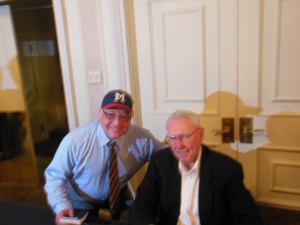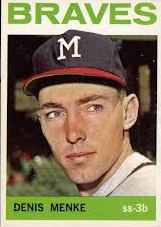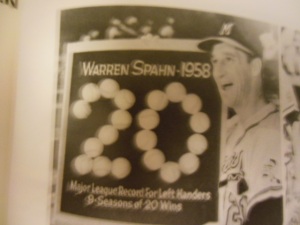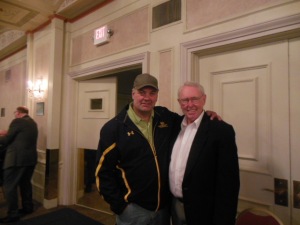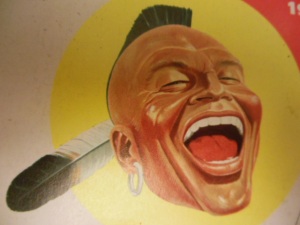Denis Menke signed as one of the Milwaukee Braves’ bonus babies in 1958, right in the middle of the team’s glory years, for $125,000. The Braves had won the World Series in 1957 and the National League pennant in 1958, and had signed John DeMerit and Robert “Hawk” Taylor for similar amounts in 1957 . Menke did not have to join the big club right away because of a change in the bonus rule and had to wait until 1962 when the Braves broke camp in Florida. By then, the Braves were a mediocre club that owner Louis Perini sold in November 1962 to a Chicago syndicate that would move the team to Atlanta.
Menke was expected to be a five-tool player who could hit, hit with power,run, throw and field. He became a five-position player under manager Bobby Bragan in 1963, playing shortstop, third base, second base, first base and left field. He socked 20 homers as the regular shortstop in 1964, suffered through an injury-plagued 1965 season, then spent two years in Atlanta before he was traded to the Houston Astros, replacing an injured Joe Morgan at second base.
When he returned to shortstop in 1969, Menke played in nearly every game and achieved All-Star status in in 1969 and 1970. In 1972, he was part of one of the most famous trades in major league baseball history, going to the Cincinnati Reds with Morgan, pitcher Jack Billingham and outfielder Cesar Geronimo for second baseman Tommy Helms and slugging first baseman Lee May. Menke retired after the 1974 season, returning to Houston for 29 more at-bats and just three hits. Afterwards, he coached in the major leagues and managed in the minors, winning a Class A pennant in 1977 with a guy named Paul Molitor.
As guest speaker at the Milwaukee Braves Historical Association dinner this past spring, Menke recalled joining the Braves in April 1962 after completing a minor league apprenticeship that took him to Class D Midland and Class B Cedar Rapids in 1958. In 1960, he had a bust-out year at Yakima (Washington) Braves and hit 28 homers, drove in 103 runs and stole 14 bases, batting .336 for a Class B fifth-place club. In 1961, Menke earned Rookie of the Year honors with the Toronto Maple Leafs of the International League and seemed to be the player that Braves farm directors John Mullen and Roland Hemond had dreamed of.
Menke started the 1962 season with the Braves but hit just .192 with a pair of homers and 16 RBI in 166 plate appearances. His first major league home run came on May 15 off Pittsburgh’s Earl Francis in a 5-4, 10-inning loss to the Pirates. Menke returned to Toronto (where he met his wife, Marguerite), then rejoined the Braves in September. On the 19th, Menke got plunked by Don Drysdale, the Los Angeles Dodgers’ hefty right-hander known for pitching inside. “Welcome back to the big leagues, kid,” Drysdale taunted. Drysdale won his 25th game that day and Menke went hitless. Still, Menke was thrilled to be in Milwaukee. “I couldn’t wait to get to the clubhouse,” he told his audience. He saw Hank Aaron’s locker, Warren Spahn’s, Del Crandall’s, Frank Bolling’s. Really something for a 22-year-old who grew up on a 480-acre farm in Bancroft, Iowa, just 15 miles from Minensota’s southern border. Every player who did not have a car got one from Wally Rank to drive for the season. Manager Birdie Tebbetts gave him trouble. “We’re gonna have you hit like (Joe) DiMaggio,” the skipper said as Menke took extra batting practice. “I went beserk,” Menke recalled. “I walked out of the cage and said, ‘I’m getting out of there.'” Shortly thereafter, it was, “Denny, we’re sending you down (to Toronto). You need to play every day.”
The five-position deal happened when Bobby Bragan became the Braves manager in 1963 and Menke returned to the big leagues for good. Menke was pegged for shortstop but the Braves still had steady veteran Roy McMillan there so Bragan installed Menke other places, depending on how the incumbents were hitting. Menke still managed to play 82 games at shortstop, 51 games at third base, 22 games at second base and a game each at first base and left field. He liked most everything about Milwaukee, except the cold spring weather. He appreciated the opportunity to be on the same team with Hall of Fame left-hander Warren Spahn, who won 23 games in 1963, dropped to six wins in ’64 and pitched for the New York Mets and San Francisco Giants in the Baves’ last year in Milwaukee.
“He never should have worn another uniform,” Menke told his audience. In fact, Menke played in the memorable pitchers’ duel between Spahn and the San Francisco Giants’ Juan Marichal in which each pitcher worked 16 innings and Spahn lost on a Willie Mays home run. Menke played third base for an injured Eddie Mathews and recalled that Giants manager Alvin Dark wanted to remove Marichal, who told Dark, “I can pitch as long as that old man’s out there.” To Willie Mays, Marichal said, “I’m done — do something about it.”
“We’ll never see a game like that again,” said Menke to his audience. “That, to me, is history. Nobody gave in to anybody.”
Menke had his best year in 1964 with 20 home runs, 65 RBI and a .283 batting average as the team’s regular shortstop. Milwaukee was in a five-team National League pennant race but finished five games back of the St. Louis Cardinals, even amid rumors that the Braves were moving to Atlanta. Milwaukee drew more than a million fans but that was the last real pennant race for the Braves before they actually went to Atlanta. In 1967, Menke learned that general manager Paul Richards had decided that “We can’t win with Menke at shortstop.” He was traded to Houston after the season and played regularly at second base in 1968 and was a two-time All-Star before the famous trade that started the Big Red Machine.
Menke played little for the Reds, then ended his career on July 10, 1974 with the Astros. He started selling real estate, insurance and securities in Houston, where people wanted to talk baseball more than financial planning. In 1977, he got a call from the Milwaukee Brewers who needed a manager for their Class A Midwest League club in Burlington, Iowa. Menke took the job for $10,000 and struck gold with a kid named Paul Molitor, who joined the team in mid-season after Milwaukee drafted him off the Minnesota campus in the annual amateur free agent draft. Molitor batted .346 with eight homers, 50 RBI and 14 steals (sounds like Menke in ’60) and the team won the pennant. Molitor went on to play 21 years in the majors, is in the Baseball Hall of Fame and is now manager of the Minnesota Twins.
Menke is proud of that and his own career, as a player, coach and manager. “I am very fortunate that I had the opportunity to play with great players, play with them and against them,” he told his audience. Menke is not in the Hall of Fame but one of his bats is. He lent it to Tony Cloninger, who, as a pitcher for the Atlanta Braves, hit two grand slam home runs in the same game on July 3, 1966.
That is Denis Menke –getting the job done without taking the credit. We need more players like him.
SOURCES

